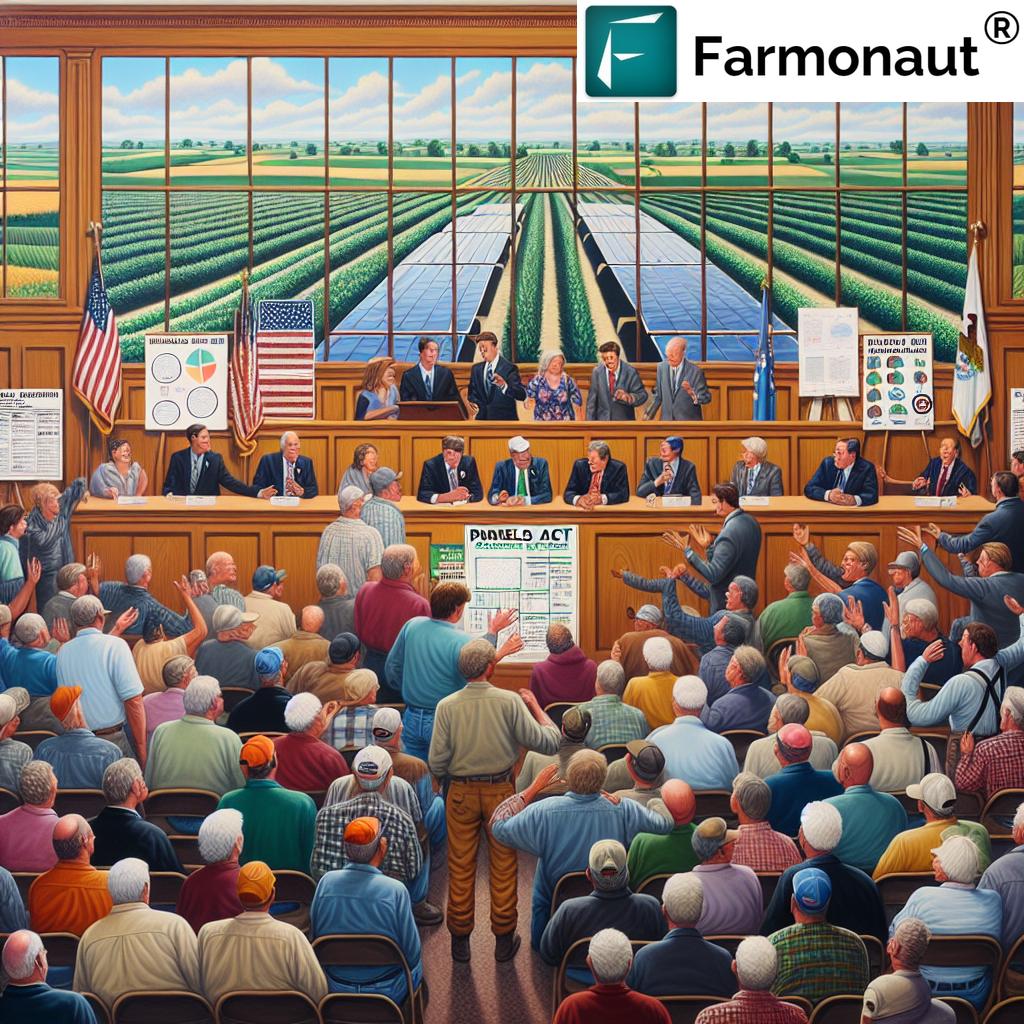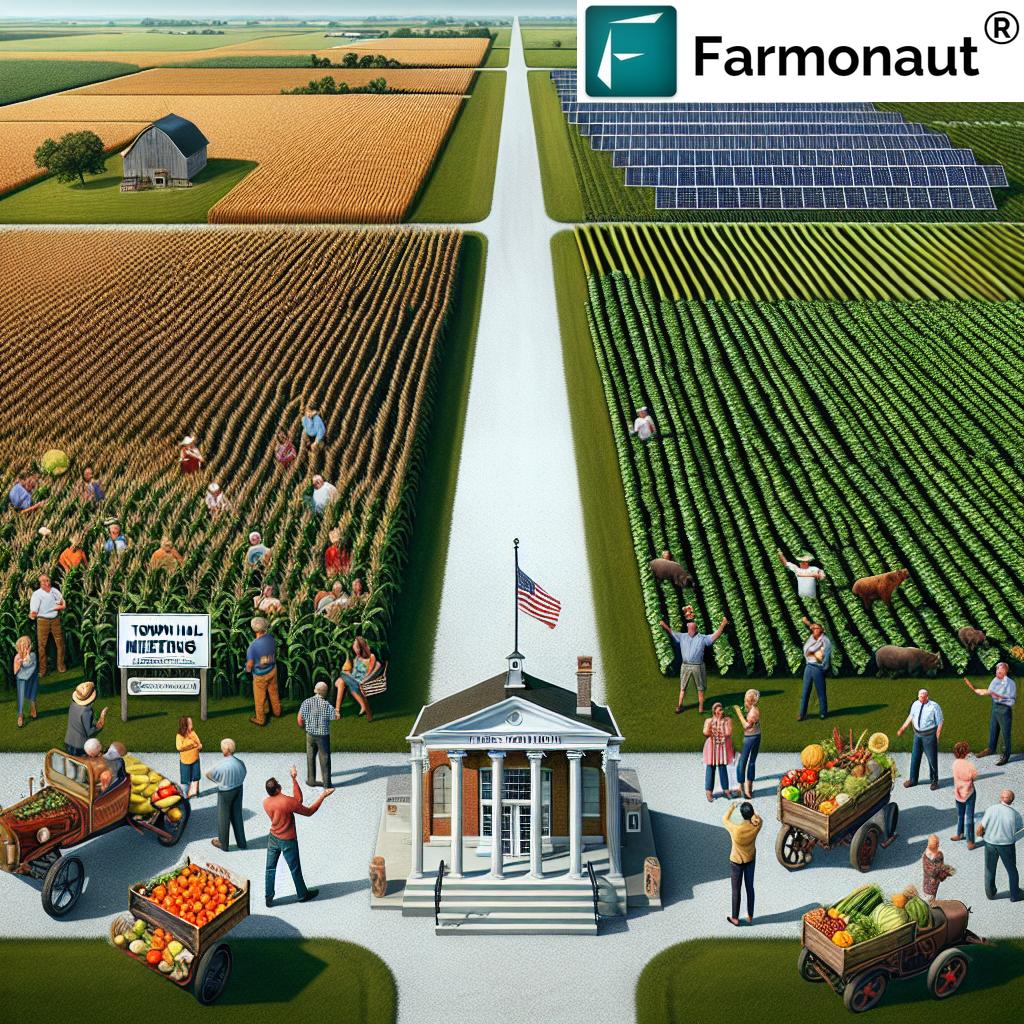Breaking News: Illinois Town Hall Meeting Erupts Over Solar Farmland Legislation and Agricultural Tariffs
“The PANELS Act aims to reduce economic incentives for solar projects on farmland, impacting up to 40% of Illinois’ agricultural land.”
“Illinois town hall meetings have seen a 30% increase in attendance due to heated discussions on farming and national issues.”

In a recent turn of events that has captured the attention of both local and national audiences, a town hall meeting in New Athens, Illinois, descended into chaos as constituents and elected officials clashed over a range of pressing issues. What was initially planned as a discussion on solar panel installation on farmland quickly evolved into a heated debate covering veterans affairs, agriculture committee oversight, and the impact of tariffs on farming. This incident serves as a microcosm of the growing tensions between rural communities and policymakers, highlighting the complex interplay between local farming interests, national policies, and the push for renewable energy development in rural areas.
The Spark That Ignited the Debate
Representative Mike Bost (R-Illinois) had called the meeting to discuss his proposals for solar energy-focused bills that would affect solar panel installation on farmland. However, as soon as we entered the meeting room in the Memorial Building on Chester Street, it was evident that the constituents had other pressing matters on their minds.
The atmosphere was charged with emotion as attendees seized the opportunity to voice their concerns on a variety of topics. Some shouted about veterans’ issues and recent layoffs at the Department of Veterans Affairs. Others demanded answers about the impact of tariffs on farming, while still others raised questions about transgender rights. The diversity of topics reflected the multifaceted challenges facing rural communities in Illinois and across the nation.
The PANELS Act: A Contentious Proposal
Amidst the commotion, Rep. Bost eventually managed to address the original purpose of the meeting: the proposed PANELS Act. This legislation aims to reduce economic incentives for solar energy projects on agricultural land. According to Rep. Bost’s website, “The PANELS Act would not prevent a farmer from leasing their property for solar panels, but it would reduce the economic incentive for companies to do so.”
This proposal has sparked intense debate among farmers, environmentalists, and policymakers. Proponents argue that it’s necessary to preserve valuable farmland for food production, while critics contend that it could hinder the transition to renewable energy and deprive farmers of potential additional income streams.
| Stakeholder Group | Current Situation | Projected Impact of PANELS Act |
|---|---|---|
| Farmers | Option to lease land for solar projects | Moderate Decrease in leasing opportunities |
| Solar Energy Companies | Active investment in farmland projects | Significant Decrease in farmland project viability |
| Local Communities | Mixed economic benefits from solar projects | Potential Decrease in renewable energy jobs |
| Land Use | Increasing solar installations on farmland | Projected 30% reduction in farmland solar projects |
| Economic Incentives | Favorable for solar development | Estimated 40% decrease in financial attractiveness |
| Energy Production | Growing share of solar in energy mix | Slower growth rate for rural solar capacity |
The Broader Context: Farming and National Issues
The heated discussion at the town hall meeting reflects a broader trend of passionate exchanges at local political events across the country. Farmers, in particular, are grappling with a range of challenges that extend far beyond the question of solar panel installation.
- Agricultural Tariffs: Many attendees expressed concern about the impact of tariffs on farming. These trade policies have significantly affected export markets for American agricultural products, leading to decreased demand and lower prices for many crops.
- Veterans Affairs: As a member of the Committee on Veterans’ Affairs, Rep. Bost faced pointed questions about recent layoffs and the overall state of veteran support services.
- Infrastructure: Given Bost’s position on the Committee on Transportation and Infrastructure, constituents were eager to discuss rural infrastructure needs, including road maintenance and broadband internet access.
These interconnected issues highlight the complex landscape that policymakers must navigate when addressing rural concerns. The heated nature of the discussion underscores the urgency felt by many rural residents who believe their voices are not being adequately heard in national policy debates.

The Role of Technology in Modern Agriculture
As debates rage on about land use and energy policy, it’s crucial to recognize the role that technology plays in modern agriculture. Innovations in agricultural technology are helping farmers navigate these complex challenges, optimize their operations, and make informed decisions about land use and resource management.
One such innovation is the use of satellite-based farm management solutions, which provide valuable insights into crop health, soil conditions, and resource utilization. These technologies can help farmers maximize productivity on existing farmland, potentially reducing the pressure to convert agricultural land for other uses.
Farmonaut, for instance, offers advanced satellite-based farm management solutions that enable precision agriculture practices. Through its web app, Android app, and iOS app, Farmonaut provides real-time crop health monitoring, AI-based advisory systems, and resource management tools. These technologies can help farmers make data-driven decisions about land use, potentially informing debates about solar panel installation and other land use issues.
The Intersection of Agriculture and Renewable Energy
The debate surrounding the PANELS Act highlights the complex relationship between agriculture and renewable energy development. As the push for clean energy intensifies, rural communities find themselves at the forefront of this transition, grappling with both opportunities and challenges.
- Economic Opportunities: Solar projects can provide additional income for farmers, particularly on less productive land.
- Land Use Concerns: There are worries about the long-term impact of solar installations on soil quality and the availability of prime farmland for food production.
- Energy Independence: Renewable energy projects can contribute to local energy independence and resilience.
- Visual Impact: Some community members express concerns about the visual impact of large-scale solar installations on rural landscapes.
As policymakers wrestle with these competing interests, it’s clear that innovative solutions will be necessary to balance the needs of agriculture, energy production, and rural economic development.
The Voice of the Farmer: Concerns and Aspirations
Throughout the heated town hall meeting, one theme remained constant: the desire of farmers and rural residents to have their voices heard in national policy discussions. Many attendees expressed frustration with what they perceive as a disconnect between Washington policymakers and the realities of rural life.
Key concerns voiced by farmers included:
- The impact of trade policies and tariffs on agricultural exports
- The need for robust infrastructure investment in rural areas
- Concerns about the long-term viability of family farms in the face of corporate consolidation
- The desire for policies that support sustainable farming practices without imposing undue burdens
These concerns underscore the need for comprehensive rural development strategies that address not only energy and land use issues but also the broader economic and social challenges facing rural communities.
The Role of Agricultural Technology in Addressing Challenges
As debates about land use and energy policy continue, agricultural technology offers promising solutions to help farmers navigate these complex issues. Advanced farm management tools, like those offered by Farmonaut, can play a crucial role in optimizing land use and resource management.
Farmonaut’s satellite-based crop health monitoring and AI-driven advisory systems provide farmers with valuable insights that can inform decision-making about land use, resource allocation, and crop management. By leveraging these technologies, farmers can:
- Maximize productivity on existing farmland
- Make data-driven decisions about crop selection and rotation
- Optimize resource use, including water and fertilizer
- Monitor the impact of different land use practices on soil health and crop yields
These capabilities can help farmers navigate the challenges posed by changing policies and market conditions, potentially reducing the pressure to convert agricultural land for other uses.
Earn With Farmonaut: Join Farmonaut’s affiliate program and earn 20% recurring commission by sharing your promo code and helping farmers save 10%. Onboard 10 Elite farmers monthly to earn a minimum of $148,000 annually—start now and grow your income!
The Path Forward: Balancing Competing Interests
As the dust settles on the heated town hall meeting in New Athens, Illinois, it’s clear that finding a path forward will require careful consideration of all stakeholders’ interests. Policymakers like Rep. Bost face the challenging task of balancing the need for renewable energy development with the preservation of valuable agricultural land and the economic interests of rural communities.
Potential solutions may include:
- Developing targeted incentives for agrivoltaics, which combine solar energy production with agricultural activities
- Investing in research to assess the long-term impacts of solar installations on soil health and agricultural productivity
- Creating comprehensive rural development plans that address energy, agriculture, and economic diversification
- Enhancing support for precision agriculture technologies that can help farmers optimize land use and resource management
By leveraging advanced agricultural technologies and fostering open dialogue between policymakers and rural communities, it may be possible to find innovative solutions that address the complex challenges facing America’s heartland.
Conclusion: A Call for Collaborative Solutions
The tumultuous town hall meeting in New Athens, Illinois, serves as a stark reminder of the complex challenges facing rural America. From debates over solar panel installation on farmland to concerns about agricultural tariffs and veterans’ affairs, the issues raised reflect the multifaceted nature of rural policy challenges.
As we move forward, it’s clear that addressing these challenges will require a collaborative approach that brings together farmers, policymakers, environmentalists, and technology innovators. By leveraging advanced agricultural technologies, fostering open dialogue, and developing comprehensive rural development strategies, we can work towards solutions that balance the needs of all stakeholders.
The path ahead may be challenging, but by working together and embracing innovation, we can build a sustainable and prosperous future for America’s rural communities.
FAQ Section
- What is the PANELS Act?
The PANELS Act is proposed legislation aimed at reducing economic incentives for solar energy projects on agricultural land. It seeks to balance renewable energy development with the preservation of farmland for food production. - How might the PANELS Act affect farmers?
The act could potentially reduce opportunities for farmers to lease their land for solar projects, impacting a potential additional income stream. However, it aims to preserve more land for traditional agricultural use. - What role does agricultural technology play in these debates?
Agricultural technology, such as satellite-based farm management solutions, can help farmers optimize land use and resource management. This can inform decisions about whether to use land for solar projects or traditional farming. - How are tariffs impacting American farmers?
Tariffs have affected export markets for American agricultural products, leading to decreased demand and lower prices for many crops. This has created economic challenges for many farmers. - What are some potential solutions to balance renewable energy development and agricultural interests?
Possible solutions include developing agrivoltaics (combining solar energy with agriculture), investing in research on the long-term impacts of solar installations on farmland, and creating comprehensive rural development plans.
For more information on how technology can help address these agricultural challenges, explore Farmonaut’s solutions:
For developers interested in integrating Farmonaut’s satellite and weather data into their own systems, check out our API and API Developer Docs.







